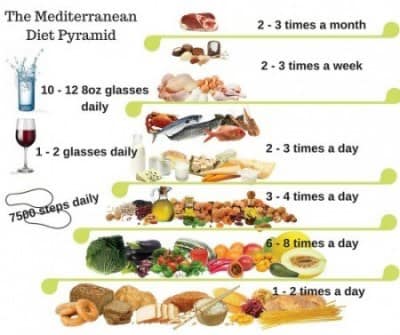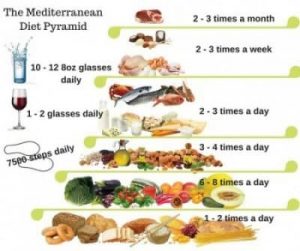Mediterranean diet- found to be the most effective healthy food eating approach out there for long term Success.
Why? People it’s easy to stick to. Doesn’t cause a huge change or restriction for most. Modified changes.
Read more –
What to Eat: Vegetables, fruits, nuts, seeds, legumes, potatoes, whole grains, breads, herbs, spices, fish, seafood and extra virgin olive oil.
Eat in moderation: Poultry, eggs, cheese and yogurt.
Eat only rarely: Red meat.
Don’t eat: Sugar-sweetened beverages, added sugars, processed meat, refined grains, refined oils and other highly processed foods.
You should avoid these unhealthy foods and ingredients:
Added sugar: Soda, candies, ice cream, table sugar and many others.
Refined grains: White bread, pasta made with refined wheat, etc.
Trans fats: Found in margarine and various processed foods.
Refined oils: Soybean oil, canola oil, cottonseed oil and others.
Processed meat: Processed sausages, hot dogs, etc.
Highly processed foods: Anything labeled “low-fat” or “diet” or which looks like it was made in a factory.
You must read food labels carefully if you want to avoid these unhealthy ingredients.
Foods to Eat
Exactly which foods belong to the Mediterranean diet is controversial, partly because there is such variation between different countries.
The diet examined by most studies is high in healthy plant foods and relatively low in animal foods.
However, eating fish and seafood is recommended at least twice a week.
The Mediterranean lifestyle also involves regular physical activity, sharing meals with other people and enjoying life.
You should base your diet on these healthy, unprocessed Mediterranean foods:
Vegetables: Tomatoes, broccoli, kale, spinach, onions, cauliflower, carrots, Brussels sprouts, cucumbers, etc.
Fruits: Apples, bananas, oranges, pears, strawberries, grapes, dates, figs, melons, peaches, etc.
Nuts and seeds: Almonds, walnuts, macadamia nuts, hazelnuts, cashews, sunflower seeds, pumpkin seeds, etc.
Legumes: Beans, peas, lentils, pulses, peanuts, chickpeas, etc.
Tubers: Potatoes, sweet potatoes, turnips, yams, etc.
Whole grains: Whole oats, brown rice, rye, barley, corn, buckwheat, whole wheat, whole-grain bread and pasta.
Fish and seafood: Salmon, sardines, trout, tuna, mackerel, shrimp, oysters, clams, crab, mussels, etc.
Poultry: Chicken, duck, turkey, etc.
Eggs: Chicken, quail and duck eggs.
Dairy: Cheese, yogurt, Greek yogurt, etc.
Herbs and spices: Garlic, basil, mint, rosemary, sage, nutmeg, cinnamon, pepper, etc.
Healthy Fats: Extra virgin olive oil, olives, avocados and avocado oil.
Whole, single-ingredient foods are the key to good health.
What to Drink
Water should be your go-to beverage on a Mediterranean diet.
This diet also includes moderate amounts of red wine — around 1 glass per day.
However, this is completely optional, and wine should be avoided by anyone with alcoholism or problems controlling their consumption.
Coffee and tea are also completely acceptable, but you should avoid sugar-sweetened beverages and fruit juices, which are very high in sugar.
Healthy Mediterranean Snacks
You don’t need to eat more than 3 meals per day. But if you become hungry between meals, there are plenty of healthy snack options:
A handful of nuts.
A piece of fruit.
Carrots or baby carrots.
Some berries or grapes.
Leftovers from the night before.
Greek yogurt.
Apple slices with almond butter.
How to Follow the Diet at Restaurants
It’s very simple to make most restaurant meals suitable for the Mediterranean diet.
Choose fish or seafood as your main dish.
Ask them to fry your food in extra virgin olive oil.
Only eat whole-grain bread, with olive oil instead of butter.


